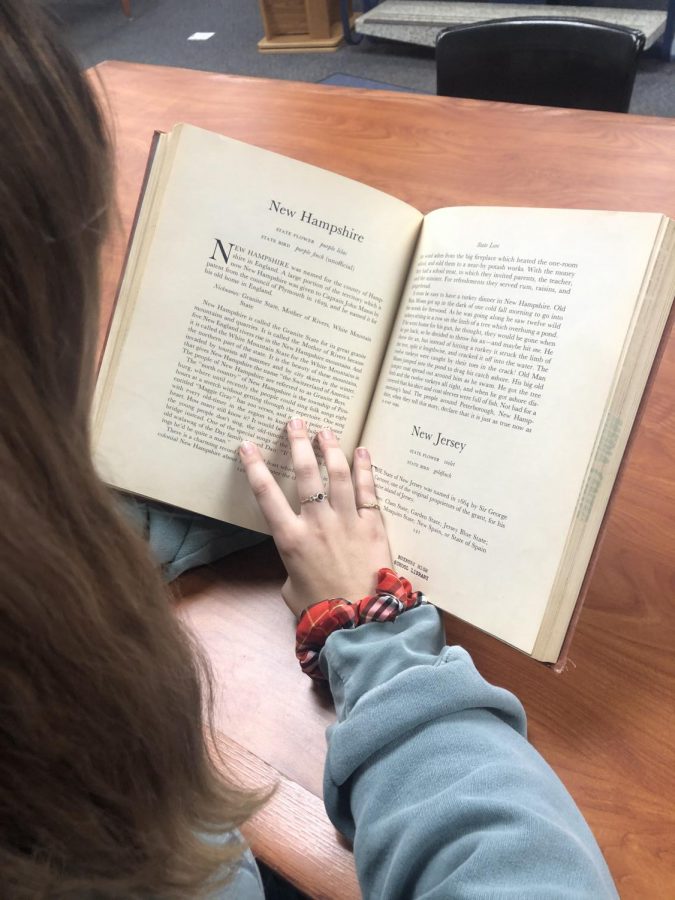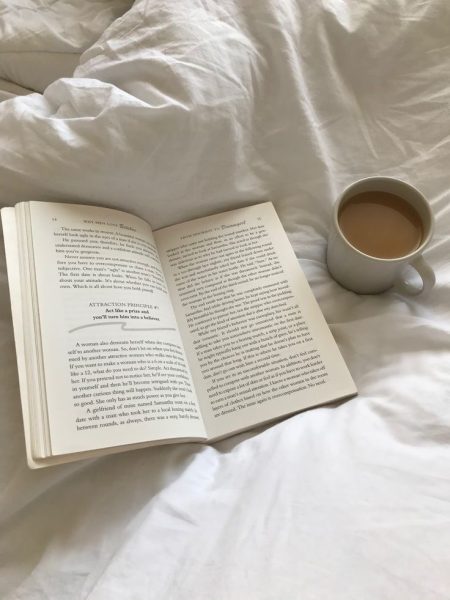The Benefits of Reading Literature
Photo courtesy of Tara Roumes.
When was the last time that you picked up a book? Not for school or work but for pure pleasure and enjoyment? Most people aren’t reading as much as they used to, and it’s alarming. According to research data done by the Pew Research Center, the amount of adults who haven’t read a single book in a given year has tripled since 1978. Reading has dozens of benefits and helps your brain develop skills such as higher vocabulary, empathy, and writing ability.
So if these skills exist, why aren’t people reading every day? Well, one could argue that it’s similar to how we’re supposed to stop eating junk food, but we don’t. Often people feel as though reading is intimidating and they don’t have time. However, reading for just 15-30 minutes a day can strengthen your brain and even help you live longer. At other times people, especially students, associate reading with schoolwork and it creates the idea that reading can’t be fun.
To get her opinion on the benefits of reading for teens and adults, I interviewed my English teacher, Ms. Rispoli. On the barriers of getting students to read, she said, “It is a culture problem. It’s not about getting kids to read, it’s about getting an entire culture to begin to value reading. We can offer kids choices, we can encourage them through time, we can try to instill a passion, but this is not a world that really promotes reading.”
On that note, here are some of the major benefits of reading, especially for adolescents.
Relieving Depression and Stress
One of the major benefits of reading is relieving symptoms of depression or other mental health issues. Often people suffering from depression will feel alone and isolated, and an escape to a fictional world with interesting characters can help them feel better.
When asked about this topic, Mrs. Rispoli said: “Kids who were once really closed off maybe found a character who spoke to something in them, and it brought them back to life.” Reading can give a new perspective on the world in general and a fictional character can often be like a friend.
Increasing Vocabulary and Comprehension
Another benefit is increased vocabulary and comprehension. Researchers have found that students who read often, especially when they begin at a young age, develop a greater vocabulary and more comprehension skills. You may be thinking, “Wow what am I going to do with vocabulary skills? I’m not planning on writing a book.” However, increased vocabulary is a necessary skill. It’s important to be able to speak adequately to peers and superiors in school and the workplace.
A poll was done in 2019 by Cengage that showed that 69% of employers look for hires that are able to communicate effectively with others, and this is an easy skill to build when reading. This is because reading exposes you to a plethora of new words, which gives you multiple options when trying to present a subject.
Reading also helps comprehension, which is (you guessed it!) another critical skill in school and later life! Reading comprehension assists with the ability to understand what you are reading the first time you read it. Nobody wants to be sitting and rereading an article over and over again, and reading is a great way to strengthen your brain so that you can understand things on the first try.
Prevents Declines in Thinking and Awareness
Yet another reason why reading is so important is that it prevents cognitive decline as we age. Reading exercises our brains in ways that we don’t use very often, and it’s very intellectually stimulating. Everyone wants to keep their brains working well as they grow older. I mean, you do not want to be forgetting everything you do when you get older, do you? (Like when your parents are looking for the keys and it’s in their hands the entire time).
No one wants to be that person, and studies are showing that reading is one of the things that helps you not become your parents.
Stronger Analytical Thinking Skills
You know in English class when your teacher whips out some sort of insane analysis of a 4 sentence paragraph? We’ve all seen it, and we’ve all been dumbfounded by the process by which they got that information. Or, you’re watching a crime show, and they solve the case and analyze the crime scene with ease. Reading can help with that, too.
When reading a thriller or mystery novel, many try to solve the puzzle before the book ends. That deeper reading and thought can actually help you get better grades and improve yourself. You’ll become more observant and likely actually participate in English and History classes. Analytical skills help with picking up on more details in the plot and characters, which can aid you in enjoying the story.
So now that I’ve convinced you to read, what books should you start out with? Some of my recommendations if you’re just starting out would be One of Us is Lying. by Karen M. McManus. This book is about 4 kids who are accused of murdering a fellow student during detention. Another great one is Red, White, and Royal Blue by Casey McQuiston. This selection is about a romance between the First Son of the United States and the Prince of England. These are both standalone and enjoyable novels that aren’t too daunting if you want to start out slowly.
Ms. Rispoli recommends students to “Read shorter things. Don’t pick up a 750-page book with multiple chapters and perspectives and all this crazy stuff.” She recommends finding an author you enjoy and read everything they’ve written, and speaking to friends about what they would recommend to you. (Trust me, your reader friend will be thrilled to do this).
A great way to find new books is to click this link, which leads to almost all of the books in the RHS library in ebook form. It’s a great place to start if you want to pick up a new book!
In the words of Dr. Suess “The more you read, the more things you know. The more you learn the more places you’ll go.”
Sources:
Benefits of Reading Books: How It Can Positively Affect Your Life
Short- and Long-Term Effects of a Novel on Connectivity in the Brain
10 Benefits of Reading: Why You Should Read Every Day
12 Reasons Students Don’t Read & What You Can Do About It | Terry Heick
Cognitive Health and Older Adults | National Institute on Aging
Analysis | Leisure reading in the U.S. is at an all-time low

Nancy Bogardus is a freshman at RHS. She has been obsessed with stories from a very young age and has always dreamed of writing her own romance novel....







Cat • Jun 27, 2021 at 9:08 PM
My (now ex) boyfriend couldn’t understand how I figured out the main plot twist in the movie Inception within about the first fifteen minutes of the movie the first time I watched it. I pointed out the things that had made it almost painfully obvious to me, it was little details that I picked up but he totally missed. So yes, reading – a wide variety of things! – helps you to be more observant overall.